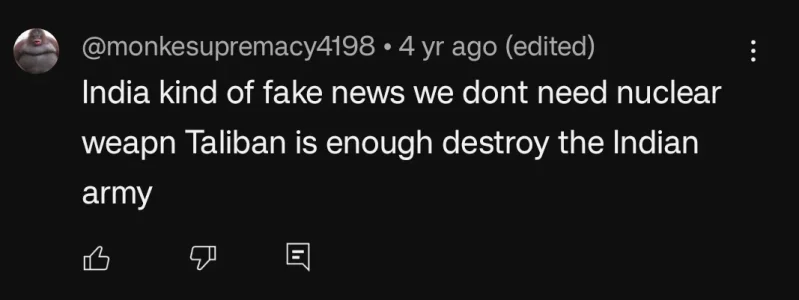- Joined
- Jul 1, 2024
- Messages
- 852
- Likes
- 3,972
Naik is now a Raa agent!
STSJ slogans raised for him.
View: https://x.com/meghupdates/status/1845040731250929875?s=46
Breaking news I want to hear.
Zakir Naik killed for doing gustakhi
Naik is now a Raa agent!
STSJ slogans raised for him.
View: https://x.com/meghupdates/status/1845040731250929875?s=46
Bharat Rakshak guys are the OGs, nobody comes close to their levels of sarcasm and humour. None.That title is the funniest shit I've ever readView attachment 12121
Man,that thread is just too funny.

Bharat Rakshak guys are the OGs, nobody comes close to their levels of sarcasm and humour. None.
This BRF stuff still cracks me up
View: https://youtu.be/wciSG_3-x28?si=so6v5lv8zV986Fug

Hassan Hussain Hassan hussain Hassan hussain Haaaassaaan ubbruubruuubuiiii
View: https://twitter.com/ImtiazMadmood/status/1786478334320267647
Refresh, most are videos btwI cannot able to see lot of Tweets man.
Try to put an screenshot also.
Fuck Elund Muskuito.
Who the Olla is Halima???View attachment 12140
But when did male pakistan boy sleep with female turkey girl ?
Who the Olla is Halima???
The Irony of the Torkish Jeans is that majority of them act like Europeans and French trying hard to kang on as Muh Europeans. Infact you won't find a difference between attire and antics of Muh Torkish and Muh Europoor.You know the Ertrugurul serial that these Pakeez watch and suddenly they get "Torkish Jeans"?
So Halima is the waifu of Erturgutrul.
The actress is 100% tunch maal and acts like a Good Girl, therefore all Pakeez have the hots for the particular actress and think the normal Istanbuli girls are also pious muslimas.
The actress who plays Halima is a normal skin-showing actress as found in any part of the world, so you had madarssa-chap Packies raiding her instagram and giving her sermons like "Halima baji aisay kapday mat phno yay too haram hota hay"
I suppose some similar word for prost*teWho the Olla is Halima???
Nebhar. Bakistani boys only sleeb with their cousins or goats.View attachment 12140
But when did male pakistan boy sleep with female turkey girl ?
